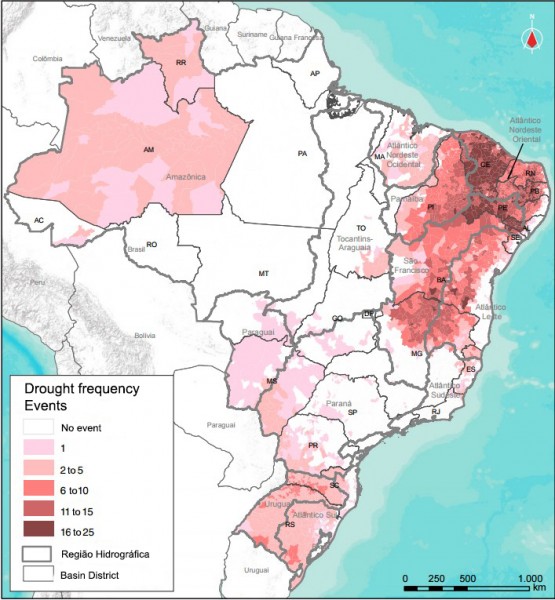Water resources are vital to maintain life. However, humanity is watching significant changes in water cycles, because of the irregular distribution of rains. Water resources contamination was increased by population growth and the resulting urbanization. These factors added to climatic anomalies, caused a reduction in the area of rain water catchment and in soil waterproofing. Therefore, our resources are increasingly scarcer, an issue that is largely discussed globally.
Rains irregular distribution, storage limitation and resources use can cause a water deficit in the soil and jeopardize food production. In Brazil, several regions are suffering with water cycle changes, shown in Chart 1 below.

Chart 1. Frequency of drought critical events occurrence in the Brazilian territory (2003-2015)
Although the Northeast of Brazil is the leader in terms of relative concentration of drought, it also occurs in coffee producing regions, as in the north of the State of Espírito Santo, where drought caused a drop in conilon coffee production, which impacted the whole coffee productive chain.
In various economic segments, the management of this natural resource in productive processes is essential, and in the coffee universe, it became a trademark. Consórcio Pesquisa Café entities, coordinated by Embrapa Café, developed technological solutions for the use of water in coffee crops which, in addition to streamlining the use of water, contributed to optimizing productivity, product quality and reduced production costs. Such technologies, as more efficient irrigation systems, the controlled water stress technology, residual water cleaning system in post-harvesting process and water-retaining polymers contribute to increase coffee farmers’ income.
In Brazil, the total irrigated area is estimated at 6.11 million hectares, or 21% of the Brazilian potential, which corresponds to 29.6 million hectares. According to an Embrapa Café research on coffee crops, between 25% to 30% of the Brazilian coffee plantation area use modern irrigation methods, with equipment that reduce the use to an average of one thousand liters of water per one kilogram of coffee. This is a significant figure, since it contributes to a 50% drop in the natural resource consumption, when compared to five years ago.
In the context of sustainability, irrigated coffee plantations are a reality in the various areas of production in Brazil, and the adoption of more efficient irrigation systems, such as drip emitters, is fully accessible to coffee growers.
We stress that the future of irrigation management involves the use of modern and automatic sensors with remote controls, which is a basic need for sustainable production in irrigated coffee plantations, involving technical and operational criteria. A future that is increasingly more present daily in many farms of Brazil, a global leader in technology and innovation in food, fiber and renewable energy production.
In this sense, Cecafe actively acts to promote the best practices in water resources use. The Digital Coffee Farmer Program was restructured in 2016, after a partnership with the Coffee Global Platform. The program adopted a Coffee Sustainability Curriculum, which includes 18 fundamental items to attain sustainable production. Water and irrigation use is one of the subjects taught to bring the notion of water resources responsible management to small farmers.
Furthermore, the program helps the adoption of good practices in productive systems, in order to harmonize the rational use of natural resources as water and soil, promoting an increase in the business yield, improvement in property management and coffee quality, as well as ensuring environment sustainability, and improving the rural population’s living conditions.
The engagement of representation entities and research institutions, the development and innovation in coffee crops will strengthen new technologies dissemination with specialized technical training programs and defined goals as well as the comparison of outcomes with goals, which provide a high adhesion and continuity, and reaffirms Brazil’s leadership role in coffee crops.
*Marcos Matos, General Manager — CECAFE
*Marjorie Miranda, Social Responsibility and Sustainability Coordinator — CECAFE


Leave A Comment